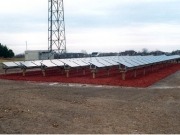
The coalition unites energy majors which so far include Alpine Energie, DONG Energy, First Solar, GE Energy, and Shell – all big investors in gas and renewable projects, who have taken strong positions supporting EU climate action. Executives from these firms stressed “the ideal partnership of gas-fired and renewable portfolios” at the launch event on 31 October, although the issue is contested in policy circles.
“We tried to bring together a broad alliance of companies covering both renewables and the gas-fired power sector,” said Jörg Gmeinbauer, the director of Alpine Energie. “Our main aim is a systems-based approach to regulation, trying to come up with integrated solutions for the energy system as an integrated whole,”
While some environmentalists agree that gas has a role to play as a transition fuel, others fear it will rather end up as a destination, crowding out investment in renewables and locking fossil fuels into the energy mix for decades to come, through new builds. But among policymakers, gas is seen as a crucial “balancing capacity” in Europe’s power grid, compensating for a current lack of renewable-sourced electricity in the grid when the sun is not shining, or the wind blowing. Future increases in storage capacity and technologies may also help to ameliorate this.
None of the panellists were keen to talk about a timeframe for the phase out of gas.
“You will still need gas power plants as part of the energy system after 2030 and it is very hard to imagine smart grids or demand management without them,” said Dick Benschop, Shell's Netherlands Gas Markets vice president.
A highly-efficient combined cycle gas turbine (CCGT) plant can emit around half as much carbon as a coal-fired plant, although it is unclear whether use of such technology will be a platform for the new coalition.
And, with carbon capture and storage (CCS) technology fixtures, gas “could also be a part of the low-carbon electricity sector in the long term,” the EU's energy commissioner, Günther Oettinger, told the alliance’s launch.
For the moment, CCS demonstration projects in the EU are struggling to meet their deadlines and the only plant of significant size, Sleipner in Norway, stores just 1Mt of CO2 per year, around one-five thousandth of the EU’s annual emissions.
Other similar alliances have been launched in the last year but proved short-lived. Some finessing will be needed to agree common positions on issues such as: the desirability of a carbon floor price, shale gas, the types of gas production counted as low carbon, the length of the transition from gas to a renewables-based economy, and even 2030 renewables goals themselves.
Panellists at the 31 October launch told EurActiv that an internal dialogue would be forthcoming, and that measures to confront the burgeoning European market for cheap coal would be a key priority.
“We don’t have final answers,” Jan Ingwersen, vice president of Dong Energy, said. “You have a political ambition and wish for a greener energy future but the reality we see on the market is that you get coal due to the [failure of the] price mechanism. Dong Energy was “pro-Emissions Trading System [ETS] reform, but re-establishing the ETS as a driver for investments will be a big task. In the meantime you might have to use part-measures like backloading.”
Questions of policy destinations and pathways remain unanswered in several EU climate and energy debates, notably shale gas.
“We have shale gas in Europe and it is our duty to convince people that we are thoughtful and responsible in how we handle it,” said Stephan Reimelt, chief executive of GE Energy Germany. “If it is there, it should be explored in an environmentally-friendly way and we have to forget horror scenarios and come down to facts,” he told EurActiv. “It’s a solution we have to look at.”
In contrast, Ingwersen, emphasised that the alliance was beginning a long journey and had not taken a stand on such issues. “We are all aware that there might be some environmental issues you need to be aware of in exploiting shale gas and it’s important to take due care of that,” he said.
The EU will begin discussion on 2030 targets towards the end of this year, with publication of carbon market reform proposals expected sometime this month. Commissioner Oettinger has called for a decision on new EU climate targets by the end of 2014 in readiness for the 2020 EU climate target for 20% improvements in carbon emissions, renewable energy and energy efficiency.
Further information
European Commission Energy Roadmap 2050
Renewable Energy Policy Network for the 21st Century (REN21)

